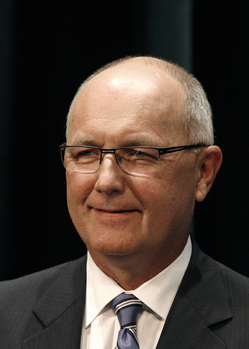U.S. Sen. Debbie Stabenow and her Republican opponent Pete Hoekstra both say they share Ann Arbor's values when it comes to topics like education, the environment and equal rights.
"I think it's very, very consistent," Hoekstra said. "One of your native sons, who is now governor of Michigan, I think is doing a phenomenal job in bringing those kinds of issues to the forefront and doing it in a very constructive way and getting this state turned around."
Gov. Rick Snyder has earned criticism in Ann Arbor, though, for cutting education funding, including a 15 percent hit to universities, and signing into law a ban on domestic partner benefits for public employees that was seen as a setback for equal rights in Michigan.

Pete Hoekstra
Snyder is supporting Hoekstra as he looks to unseat Stabenow, the Democratic incumbent, on Nov. 6.
"Rick and I went through a political campaign for governor where we ran against each other, but we share the same kind of values in terms of how we approach the political process and how we support policy," Hoekstra said. "Rick was one of the first ones to encourage me to run for the U.S. Senate."
Hoekstra said he wants to go back to work in the nation's Capitol on behalf of Snyder, who told AnnArbor.com recently that Michigan's reinvention should be a model for Washington.
"What he is looking for is a friend and a colleague to work with in Washington so the direction and synergy we are building in Michigan would be complemented," Hoekstra said.
Stabenow served in the U.S. House from 1997 to 2001 before joining the U.S. Senate, where she chairs the Committee on Agriculture, Nutrition and Forestry. She previously served in the state Legislature from 1979 to 1994 and before that on the Ingham County Board of Commissioners.
Stabenow considers herself an advocate for education and Michigan's natural resources. On keeping Asian Carp out of the Great Lakes, she remarked: "That fish is keeping me up at night."
She said she and Hoekstra come from very different places philosophically and she's not sure Hoekstra would help bridge the partisan divide in Washington.
"Pete very proudly talks about the fact that he and Michele Bachmann started the Tea Party Caucus," she said. "In my judgment, that has been one of the major reasons for gridlock in terms of an extreme group of people that would rather run the country over a cliff than work across the aisle.
"We have a very different view in terms of the economy and he would argue for more tax policies and spending policies that occurred during the Bush years," she added. "We don't need to go back to policies that are just tax cuts for multimillionaires, big debts and deregulation on Wall Street, which cost us 8 million jobs and a lot of pensions and a lot of 401(k)s for people in Michigan."

Debbie Stabenow
Hoekstra said he's not against equal pay for equal work, but he didn't support the act because, in his opinion, it was all about making it easier for people to sue businesses. The law President Barack Obama signed shortly after taking office amended the Civil Rights Act of 1964 so that unfair pay complaints can be filed within 180 days of a discriminatory paycheck.
Hoekstra said businesses and entrepreneurs looking to break into new fields already face enough rules and regulations that make it difficult to create jobs and they don't need more laws that make it harder for them to defend themselves against pay discrimination lawsuits.
"That's one of the things that Rick and I are both very, very much focused on is creating an environment in America and creating an environment in Michigan so that we can get those startup companies and those folks with great ideas to launch those ideas in the U.S. and Michigan and places like Ann Arbor," Hoekstra said, vowing to fight against impediments to doing business.
Stabenow said her approach to getting the nation's economy going focuses on supporting innovation, investing in education, asking those at the top to pay a little bit more to pay down the nation's debt, and making smart decisions when it comes to spending cuts.
She said she's encouraged by the high-tech companies coming out of Ann Arbor and the role the University of Michigan is playing in the economic recovery.
"I've worked extensively with the university," she said. "I've worked on all kinds of different efforts that relate to technology, including advanced batteries, as well as bio-manufacturing, bio-tech, all kinds of efforts that have brought in dollars over the years for the university."
Both candidates supported the auto bailouts, but Hoekstra has criticisms of how it was handled. On abortion, Stabenow is pro-choice while Hoekstra is pro-life. On health care reform, Hoekstra wants to repeal Obamacare, while Stabenow says the new health care law was the right move.
Hoekstra is against gay marriage, while Stabenow has a more nuanced answer to the question. She says religious institutions should decide what marriages they will perform, but civil marriage should be available to all committed couples and that should be a matter left to each state to decide.
Expanding transit options
Stabenow said she's supportive of efforts around expanding transit in Ann Arbor, including high-speed rail along the Detroit-Chicago corridor, commuter rail between Ann Arbor and Detroit, countywide transit in Washtenaw County, a regional transit authority for Southeast Michigan, and a new train station in Ann Arbor. She said she'd fight for federal funding for all of those causes.
"I think it's very important that we move on all fronts as it relates to public transportation and I think both commuter rail and high-speed rail are a very important part of our future," she said.
Hoekstra had a less direct response when asked if he would fight for federal funding for those types of initiatives. He spoke instead about the need for funding reforms, calling it absurd that Michigan must ask the federal government each year to return some of its gas tax money.
"Rather than going in and trying to convince 99 senators that they ought to give Michigan some of its money back to build a train corridor or more commuter transit options in Southeast Michigan," he said, "I'm all for taking the federal gas tax dollars that are collected in Michigan and leaving those dollars right here in Michigan and having our governor and our state legislators decide what the most appropriate transit structure, highway structure, rail structure is in the state."
Hoekstra said Michigan was a "donor state" the entire time he served in Congress. When he first got there, he said, the state received about 87 or 88 cents back for every dollar it paid in federal gas taxes, and eventually that went up to about 93 or 94 cents.
He said Michigan is at a disadvantage when it's competing for federal transportation dollars with the Washington, D.C., Metro and the New York subway system.
"Michigan can't make as compelling of a case as a lot of these other metro areas for transit dollars, and so New York and these other places, they end up getting Michigan dollars," he said.
Absent the kind of significant funding reforms he's talking about, Hoekstra said he would fight for transportation projects that are identified as priorities by the state of Michigan.
"I will work with the governor to make sure the transportation priorities the governor and the Legislature have outlined are the priorities that I will fight for in Washington," he said.
Investing in emerging industries
Stabenow said she's proud to have authored legislation that provides a 30 percent tax credit for companies that re-equip or build new facilities for clean energy product manufacturing.

Check out the MLive Voter Guide
"They traditionally have not had satellite offices and they set up the first satellite office in Detroit in July that serves all of Michigan," she said. "Ann Arbor is a big piece of that, being able to go down and deal with a patent office right in Michigan so we can deal with these new kinds of technologies."
Stabenow remains an unabashed supporter of strategic federal investments in emerging sectors like clean energy, including advanced battery technologies. She called the recent bankruptcy of A123 Systems — a company that used a nearly $250 million federal stimulus grant to set up manufacturing operations in Livonia and Romulus — a "disappointing situation." But she said she's glad at least auto parts maker Johnson Controls Inc. is buying the company's automotive business for $125 million.
"Like any new industry, it's going to take time and not every company will be successful," she said. "The good news is we have a whole lot more successful businesses in Michigan than not."
Hoekstra said he's not in alignment with Stabenow when she talks about targeted investments in specific companies like A123 Systems.
"I am totally opposed to the federal government going out and saying, LG Chem in Holland, Mich., you're going to get $130 million, A123 in Southeast Michigan, you're going to get $250 million," Hoekstra said, calling that picking winners and losers.
"I think that maybe on a broader basis we can provide investments and tax credits for people generally in a field we think has high potential," he said, adding he'd support short-term tax breaks for entire industries — not select companies — where there's potential for job creation.
Stabenow said she's optimistic about Michigan's chances of winning a nationwide competition for $20 million a year in federal funding to launch a new national advanced battery innovation hub, which was included in her Battery Innovation Act of 2011.
"Ann Arbor will play a big role in that if we get it," she said, adding she's been in talks with Michael Finney, CEO of the Michigan Economic Development Corp., about the state's proposal.
"He reached out to the University of Michigan and I think Michigan State as well, and working with a number of companies," Stabenow said.
"I know we're in the finals on this," she added. "The Department of Energy will select one of the proposals for a national innovation hub, and then funding will come in. And if Michigan gets it, the University of Michigan certainly will get part of that funding."
Hoekstra received a master's degree in business administration from U-M's Ross School of Business in 1977 before going to work for office furniture maker Herman Miller for 15 years.
"I came out of a company that was always recognized for cutting-edge design, innovative management practices, recognized globally for excellence in design," he said. "So I've always been a strong supporter of creating environments where innovation and technology-driven companies can grow and prosper, and clearly that's the kind of community that you see in Ann Arbor."
Hoekstra said he would support policies that grow the economy and create a more stable future for students graduating from places like U-M.
Asked about his ability to work across the aisle, Hoekstra said he's proud of his time in Washington during the 1990s, working with President Bill Clinton and others on a bipartisan basis to reform welfare, slow the growth of spending and reduce taxes.
"The end result was that we had a period of really unprecedented growth in the 1990s that enabled us to balance the budget, enabled us to grow this economy and enabled us to make sure there were jobs out there," he said. "When I look at the problems and issues we're going to be facing in 2013, the issues are bigger but they are exactly the same issues that we faced in the mid-1990s."
Ryan J. Stanton covers government and politics for AnnArbor.com. Reach him at ryanstanton@annarbor.com or 734-623-2529. You also can follow him on Twitter or subscribe to AnnArbor.com's email newsletters.